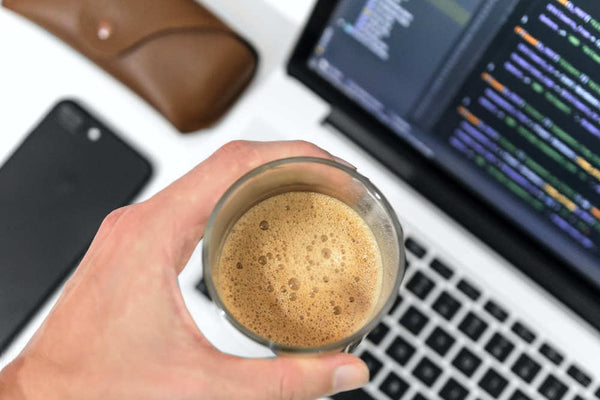It turns out that taking a break from work can be beneficial. "Let's go have some coffee" - behind this phrase may lie a way to increase productivity at work, rather than just a pleasant conversation with a colleague. Experts have come to this conclusion while discussing the results of a study conducted by ISIC (Institute for Scientific Information on Coffee) on the true reasons why people drink coffee at work.
Among the experts:
- Kit Vesnes, Professor of Cognitive Neurobiology, University of Exeter, United Kingdom
- Peter Rogers, Professor of Biological Psychology, University of Bristol, United Kingdom
- Dr. James Chandler, Political Analyst, Work Foundation
It turns out that a cup of coffee at work is not just a way to perk up. For an employer, it can even serve as an indicator of employees' productivity. To delve into this issue, we have translated the research findings and share with you the main theses.
ISIC Study: 67% of people drink coffee at work
During the study, 8,239 adults from six European countries - Finland, Germany, Italy, the Netherlands, Spain, and the United Kingdom - were surveyed. It turned out that 67% of the respondents always or often drink coffee during a typical workday.
The participants were asked why they drink coffee at work. The majority responded that they enjoy the taste of coffee (56%). Many also noted that they drink coffee to take a break from work (40%) and to feel more energized (29%).

People drink coffee at work to enjoy the taste, take a break, and energize themselves.
Before starting their workday, people drink coffee not so much for the taste but to wake up and get into the work rhythm - this was the response given by 56% of those surveyed.
Those who do not drink coffee primarily do so due to personal preferences (preferring other beverages) and lack of time. Only 7% of the respondents consider coffee harmful to them.
Coffee breaks make us more productive
Short breaks at work enhance productivity - this was stated by the majority of respondents (63%). And coffee ranked second in terms of its impact on work performance (43%). Often, both methods are combined: taking a break while enjoying a cup of coffee.
It is important not just to pour yourself a drink and return to the computer with the mug but to step into a separate space, have a conversation with colleagues, and completely detach oneself from work during the break.
Communication with colleagues during breaks helps relieve tension [12], [13], and improves the work environment. Debates and discussions on complex issues become easier. In a comfortable environment, people are better able to handle work tasks effectively.

Interacting with colleagues during coffee breaks enhances productivity and improves the work atmosphere.
The absence of breaks has a negative impact on productivity. It seems that individuals who don't have time for coffee breaks may not have the most favorable work experience. They are unable to regulate their workload independently and allocate time for relaxation. According to Robert Karasek's stress management system, a combination of high job demands and low decision-making freedom leads to chronic stress, which has a detrimental effect on employees' health and well-being. This can result in the person either missing work altogether or simply going through the motions, exerting minimal effort.
Employees with robust health and a good sense of well-being are more productive. They are more motivated and engaged in their roles and responsibilities. This was confirmed by the research findings, which revealed that respondents from the United Kingdom more frequently claimed to have no time for breaks compared to those from Finland. However, the Finns outperform the British in terms of productivity (measured by GDP per hour worked).
Coffee helps promote long-term health
In Europe, there is a challenge of an aging workforce: the proportion of people aged 65 and older is projected to increase from 18.4% to 28.4% by 2080. Moreover, people will continue working, with retirement ages in several European countries expected to exceed 70 years by 2050. US also has an increasing number of workers over the age of 60. Therefore, it is necessary to find ways to keep people healthy for longer.

Regular coffee consumption helps older individuals maintain their cognitive abilities to the fullest extent.
Various studies indicate that coffee reduces the risk of certain degenerative diseases, type 2 diabetes, cardiovascular diseases, and mitigates age-related decline in cognitive abilities. More details on the impact of coffee on health are discussed in this article.
Professor Rogers noted that the improvements in cognitive function primarily apply to older individuals who consume coffee regularly.
Why does coffee energize some people while not affecting others?
59% of ISIC survey respondents stated that they primarily drink coffee between 9:00 and 11:00, while 29% consume it between 15:00 and 17:00. This is linked to the desire to feel energized in the morning and to regain focus after lunch.
The stimulating effect of caffeine can be explained as follows: the human brain contains adenosine receptors. Adenosine binds to these receptors, leading to a reduction in the levels of stimulating neurotransmitters, such as dopamine, that contribute to the sensation of "tiredness."
Caffeine has a similar structure to adenosine and can bind to receptors in place of adenosine, thereby increasing alertness.
In the second half of the day, caffeine consumption tends to decrease as people avoid coffee for fear of it interfering with their ability to fall asleep.
While caffeine does indeed cause sleep problems for some individuals, it has no impact on sleep for others. These differences can be influenced by a person's age and body mass, but in some cases, genetic predisposition plays a role. Several genes have been identified that affect sensitivity to caffeine, such as the ADORA2A and ADA genes, as well as the DARPP-32 and PRIMA1 genes.

The same amount of caffeine in a beverage can affect two individuals with the same weight and age differently.
Coffee lovers are typically not significantly affected in terms of sleep quality, whereas those who consume it infrequently may experience difficulties falling asleep.
The same can be said about the potential anxiety caused by coffee - it is more likely to be experienced by those who do not drink it or drink it infrequently, rather than regular consumers of the beverage.
Caffeine acts relatively quickly, with its effects measurable approximately 10 minutes to 2-4 hours after consumption, depending on the amount consumed. A standard cup of coffee contains about 75-100 mg of caffeine, which has a beneficial impact on alertness.
Conclusion
If your office does not have a coffee machine, it may be worth considering acquiring one. This simple measure can create a more comfortable work environment and increase employees' productivity.
If a coffee machine is available, do not rush to pour the beverage into your mug and immediately return to your computer. Engaging in conversation with colleagues during breaks is not idle chatter or a waste of time; it is a way to improve well-being, avoid stress, and become more effective in solving tasks.
Having a cup of coffee is a reliable way to energize and focus. It does not affect sleep unless you have a genetic predisposition to its interference.


1 comment
It was interesting to me when you mentioned that caffeine acts quickly. It seems like it would be a good idea to drink coffee first thing in the morning. That way the caffeine can kick in quickly and give you the energy you need to get going for the day. http://incommonnyc.com/espresso